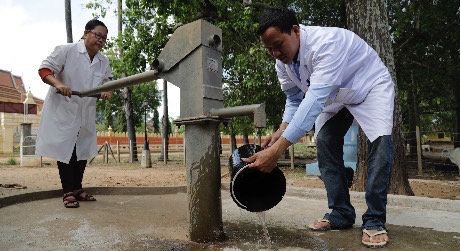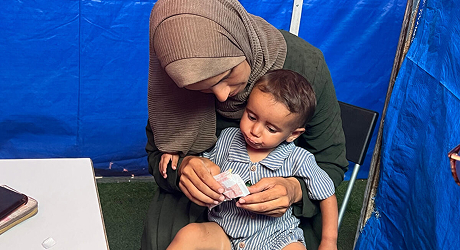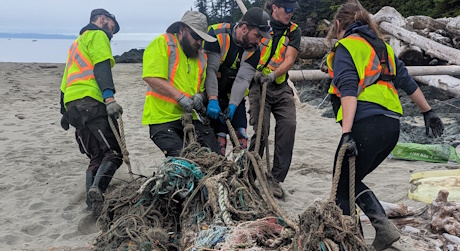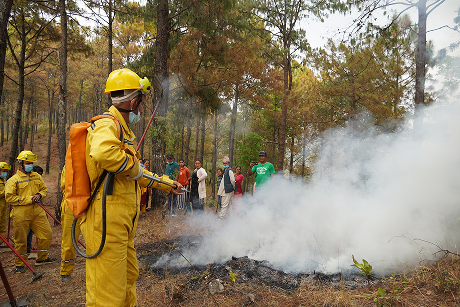Footprints Project
Since 2005, travelers like you have helped us change the world through micro-donations.

-
A total of
4686
Travelers
-
donated
$15018.44
(100% funded) -
to help improve
Water & Sanitation
-
impacting
5000
people -
in
Cambodia
Project background
More than 50 percent of people in Cambodia don’t have access to a decent toilet. While the country boasts large natural water resources, they are under increasing pressure due to climate change, industry and regional development.
With the rise of COVID-19 in early 2020, this program pivoted to emphasise the importance of promoting good hygiene for the prevention of the virus. The project supported assessments of COVID-19 hygiene and preparedness in 42 primary healthcare facilities, providing factsheets to Provincial Health Departments and the Ministry of Health. In addition, the project provided COVID-19 and hygiene promotion materials (10,000 posters), handwashing facilities, and supported the dissemination of accessible healthcare facility factsheets.
In communities, WaterAid supported the training and awareness-raising of prevention and hygiene messages to a Worker's Union, Disable Peoples Organisation’s leaders and through social media. WaterAid also documented water, sanitation and hygiene (WASH) challenges faced by marginalised peoples during the pandemic through documentary and news reports.
WaterAid Cambodia and project partners worked together to achieve the overall outcomes of the project.
Key project activities and results
WaterAid and its partners conducted the following activities:
- Developed the WASH Journalist Network (WJN) – a three-year strategy and annual work plan to provide direction to the network. The WASH Journalist Network has produced quality content, driving increased awareness of WASH issues. In the COVID-19 response the network was used by sector actors (Plan International, UNICEF and WSSCC) to share prevention messages.
- Supported five youth groups in urban and rural communities to lead three campaigns including: ‘Water is Life – Leaving No One Behind’, ‘Hygiene for All’ and ‘Menstrual Hygiene Management (MHM) for young women’. These campaigns reached 359,000 online, and 260 people (70% female) through youth-led social media messaging.
- Collaborated on drafting a factsheet for accessible WASH in healthcare facilities.
- Demonstrated the user-friendly and WASH Facility Improvement Tool in 12 healthcare facilities in Kampong Chhnang. WASH facilities in six healthcare facilities were upgraded or constructed.
- Reached more than 21,000 people through performances, workshops, and social media focused on inclusive WASH messages by using creative arts through partnership with Epic Arts and Cambodian Disabled Persons Organisation (CDPO).
- 298 WASH Professionals (112 women) upgraded their skills to deliver WASH services to communities. WASH Skills Development Organization delivered 19 training courses including; community WASH promotion, water quality testing, biosand filter construction and maintenance, latrine Design and construction, faecal sludge management, inclusive WASH and WASH for Healthy Home (COVID-19 prevention).
- 54 young people (23 women) attended the young professional program for WASH building their leadership and WASH technical skills. Over 50% of young water professional participants have started an internship program with WASH organisations and or the private sector.
Community involvement
Located in Kampong Chhnang province, the healthcare facility is one of six that received support from the Ministry of Health and WaterAid to implement user-friendly accessible WASH in healthcare facilities and the Water and Sanitation for Health Facility Improvement Tool (WASH FIT). Specific activities included strengthening the capacity of healthcare workers to assess the WASH status of their facilities, and plan for and design WASH improvements.
“I think the design of this user-friendly toilet is good because it’s easier than before. It was really difficult… because there was no handrail for pregnant women to hold. Since this is a new type of toilet, people do not always use it at first... Later, I got good feedback from clients such as from pregnant women [who] mentioned the easiness of the seat,” said Sokunthy, Director of the healthcare facility.
Following project support Sokunthy is eager to continue improving WASH conditions at the healthcare facility including increased water storage and fencing to keep animals outside of the facility grounds.
Case study
“I am worried about COVID-19 infection. I think I have a high risk of infection because of my disability… and I do not know much on how to prevent this disease”.
This is what Mai told us when we first visited him at his home in Kampong Chhnang. Mai has a physical disability and visual impairment. With limited income earning opportunities, Mai cannot afford to buy face masks. He added that he hesitates to go outside during COVID-19, as there is no accessible handwashing station for him to use, and because of his disability, he is not sure how to practice good hygiene. He told us that “I have received information on COVID-19 through different platforms: from local authorities, TV, mobile ringtone, and from my neighbor”. Despite this information, Mai told us he is not sure how to do to prevent infection from COVID-19 properly, particularly as there was no information focused on people with a disability. He added “I am really worried about COVID-19 because I am difficult to have hygiene facilities, especially for hand hygiene, and do not know much on COVID-19 prevention”. WaterAid has worked with a local Disabled People’s Organisation to provide training on inclusive WASH and COVID-19 prevention. Mai has now received information on how to protect himself from infection. He knows more on prevention message, especially on hand hygiene. He is very happy, and has suggested that the local Disabled People’s Organisation and local authority should continue its awareness raising to all people and especially for people with a disability.
What's next?
The program keeps continuing for 2021 towards achieving the following outcomes:
- Supporting people with disabilities and women groups to lead and promote equitable WASH and COVID-19 related hygiene behaviour change awareness in two districts of Kampong Chhnang province;
- Improving WASH services and hand hygiene practices in healthcare facilities in two districts of Kampong Chhnang;
- Increasing capacity of WASH sector actors on inclusive WASH skills and knowledge among WASH professionals (especially women) and local sanitation business actors in two districts of Kampong Chhnang; and
- Increasing use of WASH data and knowledge to inform planning and decision making at sub-national level.
Traveling soon? When you buy travel insurance with us, you can make a contribution towards a cause you care about.
Get a quote






